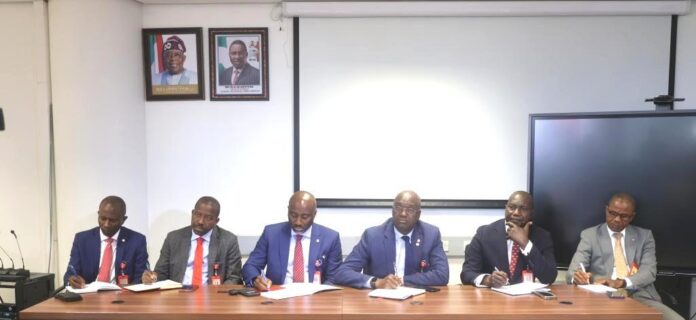The Executive Chairman of the Economic and Financial Crimes Commission (EFCC), Mr. Ola Olukoyede, says the Commission has made unprecedented strides in Nigeria’s anti-graft war, recovering over N566 billion, $411 million, and 1,502 properties within two years.
Olukoyede made the disclosure in Abuja on Thursday during a media briefing at the EFCC’s corporate headquarters, as part of activities marking his second anniversary in office.
Appointed on October 18, 2023, and confirmed by the Senate the following day, Olukoyede described the past two years as a period of sweeping reforms and record-breaking results across all operational fronts of the Commission.
Speaking through the EFCC’s Director of Public Affairs, Commander CE Wilson Uwujaren, he revealed that between October 2023 and September 2025, the Commission received over 19,000 petitions, conducted 29,240 investigations, filed 10,525 cases in court, and secured 7,503 convictions.
Within the same period, he added, the Commission recovered N566,319,820,343.40, $411,566,192.32, £71,306.25, €182,877.10, and other foreign currencies traced to proceeds of financial and economic crimes.
The EFCC also seized 1,502 non-monetary assets, 402 in 2023, 975 in 2024, and 125 so far in 2025. Among these, two stand out: the final forfeiture of 753 duplex units in Lokogoma, Abuja, and the forfeiture of Nok University in Kaduna State, now renamed the Federal University of Applied Sciences, Kachia.
Olukoyede described the recoveries as clear evidence of the EFCC’s renewed drive to trace, confiscate, and return illicit assets to the Nigerian state and victims of fraud.
He listed several high-profile prosecutions undertaken during the period, including those involving former governors Willie Obiano, Abdulfatah Ahmed, Darius Ishaku, Theodore Orji, and Yahaya Bello. Others include former ministers Olu Agunloye, Mamman Saleh, Hadi Sirika, and Charles Ugwu, as well as former Central Bank Governor Godwin Emefiele.
In December 2024 alone, the EFCC arrested 792 suspects linked to investment and cryptocurrency fraud in Lagos — among them 192 foreigners, who were subsequently prosecuted and deported. “That operation sent a strong message that Nigeria will not be a safe haven for cybercriminals,” Olukoyede declared.
He said the Commission also revived long-standing corruption cases involving Fred Ajudua, former PDP Chairman Haliru Bello Mohammed, former National Security Adviser Sambo Dasuki, and ex-NSITF boss Ngozi Olojeme.
According to him, part of the funds recovered by the EFCC has been channeled into critical national programs such as the Students Loan Scheme and the Consumer Credit Scheme, with N100 billion already invested.
He added that agencies including the Niger Delta Development Commission (NDDC), Asset Management Corporation of Nigeria (AMCON), Federal Inland Revenue Service (FIRS), and National Health Insurance Authority (NHIA) have benefited from returned funds and recovered properties — some of which have been converted to office use.
Olukoyede also highlighted the creation of a Task Force on Naira Abuse and Dollarisation of the Economy, which has curbed currency speculation and helped stabilize the naira. “The campaign against naira abuse, racketeering, and speculative trading has reduced pressure on the national currency,” he said.
The EFCC boss further emphasized his administration’s renewed focus on cybercrime prevention, recalling the National Cybercrime Dialogue held in January 2024 and the National Cybercrime Summit in October 2024, where First Lady Senator Oluremi Tinubu inaugurated the Cybercrime Response Centre.
On international cooperation, Olukoyede said the EFCC has deepened partnerships with agencies such as the FBI, UK’s National Crime Agency (NCA), INTERPOL, Japan’s JICA, and law enforcement in Korea, Spain, Germany, and Canada — leading to joint investigations and the repatriation of stolen assets.
“In 2024, we hosted the immediate past FBI Director, Christopher Wray, and the NCA’s Director General, Graeme Biggar — a testament to the global respect the EFCC commands today,” he said.
At the regional level, Olukoyede’s leadership as President of the Network of National Anti-Corruption Institutions in West Africa (NACIWA) led to the establishment of a permanent secretariat in Abuja. His re-election for a second term made him the first to achieve that feat in the body’s history.
Domestically, he said, the EFCC has undergone deep institutional reforms, including the creation of the Directorate of Fraud Risk Assessment and Control (FRAC) to strengthen corruption prevention, and the rebranding of the Department of Internal Affairs to the Department of Ethics and Integrity.
Three new Zonal Directorates have also been established in Ekiti, Anambra, and Katsina, bringing the total to 17. Meanwhile, the new EFCC Academy in Giri, with a state-of-the-art Cybercrime Research Centre, is nearing completion.
Other specialized units introduced include the Digital Transformation and Innovation Unit, International Assets Tracing and Recovery Unit, and Visa Fraud Section.
Olukoyede reaffirmed his zero-tolerance stance on corruption within the agency, saying, “You cannot fight corruption with corruption.” He disclosed that all staff were required to declare their assets upon his assumption of office, with 55 officers dismissed for misconduct, one of whom is being prosecuted for tampering with exhibits.
He noted that while errant staff have been disciplined, diligent officers have been rewarded through promotions, allowances, and the provision of CNG buses.
Reiterating that prevention remains central to his agenda, the EFCC Chairman said, “Prevention is more cost-effective than enforcement. That’s why FRAC monitors the budget performance of Ministries, Departments, and Agencies using risk-based tools.”
In 2024, the department oversaw the delivery of over 80 percent of the Presidential CNG Bus Project.
The Commission also launched EFCC Radio 97.3 FM, Nigeria’s first anti-corruption radio station, to expand public awareness and advocacy.
Olukoyede concluded by revealing that the EFCC is currently undergoing a full-scale rebranding exercise to align its identity with its renewed vision of integrity and professionalism.
“We are rebranding the EFCC for greater impact. A new logo and slogan will soon be unveiled to reflect our renewed commitment to service, transparency, and accountability,” he said.

